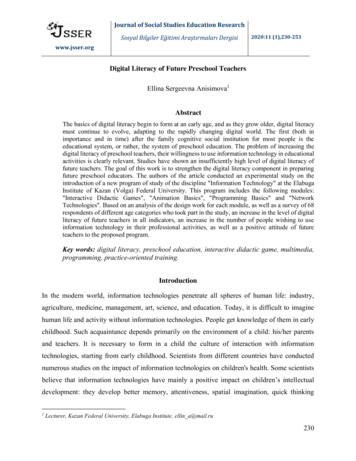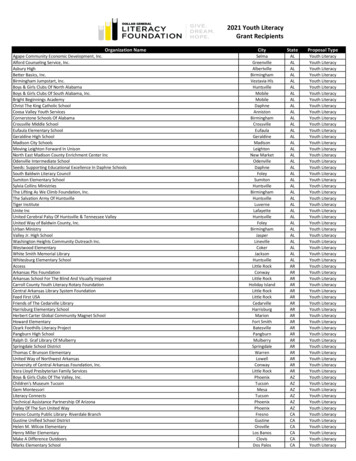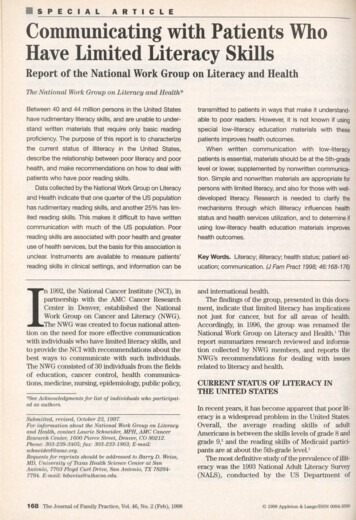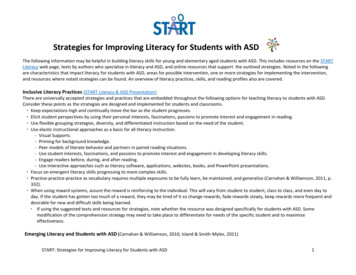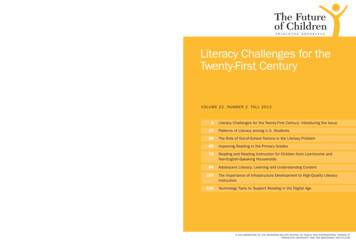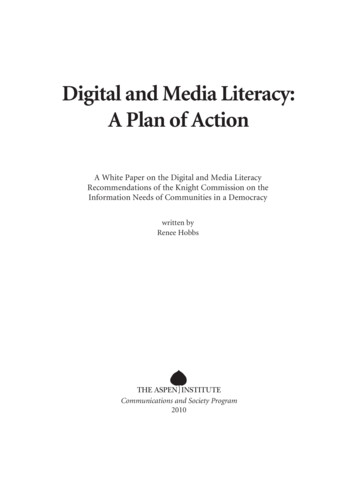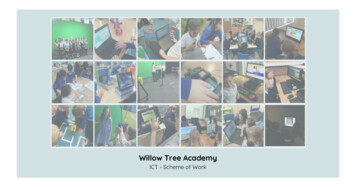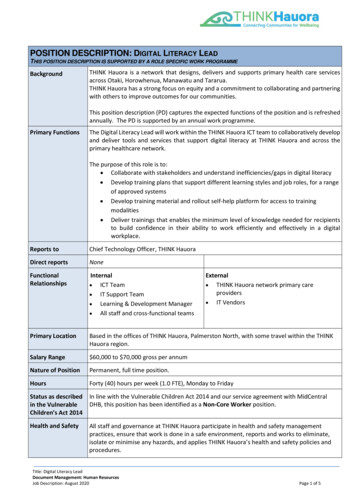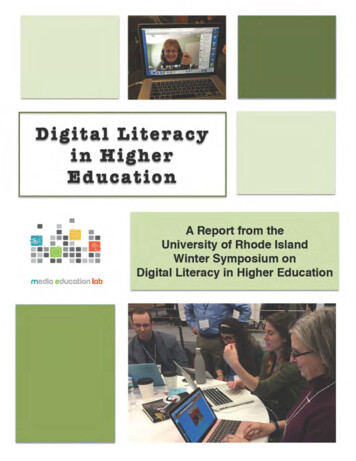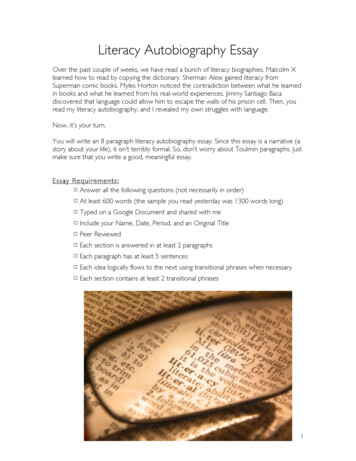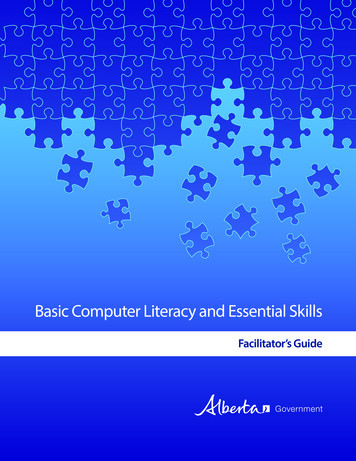
Transcription
EIFL Digital Research Literacy TrainingProgramme Outline for LibrariansOctober 2020
IntroductionDigital research literacy comprises the skills, knowledge and understanding required to producequality research outputs in a digital environment. Libraries offer a variety of training programmesfor faculty and students; however, an EIFL survey conducted in 2018 across 36 EIFL partnercountries (responses were received from 270 libraries) discovered that the only two topics wellfamiliar to librarians were “Research process” and “Writing articles and reusing content”. All otherdigital research literacy topics remained largely undiscovered.To enable university and research libraries to help researchers and students produce qualityresearch outputs, EIFL has compiled a training programme outline, which is organized accordingto the research cycle. We would like to acknowledge all the universities whose resources areincluded into this outline. Our special thanks go to the staff of the University of Dublin CollegeLibrary, especially Julia Barrett, who helped us to create this resource.How can librarians in EIFL partner countries use thisresource?This resource is organized according to the research cycle: Discover, Manage Research Data,Publish, Disseminate and Increase Visibility, and Measure Impact.Each section gives an overview of the topic, what the trainer should cover, and what the learnershould gain by the end of the training. Each topic includes “Resources for facilitators andlearners”, with useful material that trainers and learners can use to improve their own knowledgeor use in their own training.We encourage all EIFL partner countries to become familiar with this training programme and toadapt and use relevant topics to train librarians, students and researchers. In addition to thecontent, provided in this training programme, we suggest you follow the recommendations belowon how to organize and evaluate your training.Guide “Training Methodologies”, Gender and Technology Institute. wnloads/en/trainingmethodologies-en.pdfGuide “Training evaluation”, Mind Tools. trick.htm“The Open Science Training Handbook”, sections “On Learning and Training”,“Organizational Aspects” and “Examples and Practical Guidance”, p.101-182. URL:https://book.fosteropenscience.eu/enIf you would like to submit corrections or suggestions of new content and resources fo rconsideration, please contact us at: info@eifl.netEIFL Digital Literacy Programme Outline for Librarians / October 20202 www.eifl.net
DISCOVERFind your topic and review literatureSearch Google and Google ScholarOther free tools and resourcesManage your referencesKeep up to date on your topicMANAGE RESEARCH DATAManaging and sharing research dataWriting a data management plan (DMP)PUBLISHAcademic integrityChoosing effective publishing strategyUsing Open Access (OA) routes to increase research impactDISSEMINATE AND INCREASEVISIBILITYInstitutional repositoryPreprintsResearcher identity & ORCIDSocial media for researchMEASURE IMPACTIntroduction to BibliometricsMake your work countEIFL Digital Literacy Programme Outline for Librarians / October 20203 www.eifl.net
Research Lifecycle – DiscoverThis section helps students and researchers to identify their research topics; to plan andperform a literature review; to run searches using Google, Google Scholar and other freeresources; to use reference/citation management tools, and how to stay up to date with chosenresearch topic.We identified 5 topics that researchers and students must know well: Find your topic and review literature. Search Google and Google Scholar. Other free tools and resources. Manage your references. Keep up to date on your research topicFind your topic and review literatureThis training outlines a process for selecting a research topic, narrowing the topic down to aspecific research question, and carrying out literature review.By the end of this training, learners should: Be able to define a research topic. Be able to conduct a literature review.Training Outline: Select a topic for your research.Collect background information about your topic.Define your topic as a focused research question.Perform a literature review.Resources for facilitators and learnersVideos, online tutorials: “How to Develop a Good Research Topic”, Kansas State University Library. URL:https://www.youtube.com/watch?v nXNztCLYgxc “Asking Questions to Explore Your Topic”, University of Guelph. URL:https://youtu.be/azPLz8WiuuA “Four Steps to Narrow Your Research Topic”, University of Guelph. URL:https://youtu.be/rpCbSjIdXlM “How to Write a Literature Review”, University College Dublin. URL:https://youtu.be/ouY2FH0BKkQ “How to write a literature review”, University College Dublin. /story html5.htmlLibrary guides:EIFL Digital Literacy Programme Outline for Librarians / October 20204 www.eifl.net
“Finding and Exploring Your Topic”, University of Michigan. URL:https://guides.lib.umich.edu/c.php?g 283095&p 1886088“Find background information”, University of Guelph. mation“Literature Review”, Bloomsburg University of Pennsylvania. Literature Review: Conducting & Writing”, University of West Florida. URL:https://libguides.uwf.edu/c.php?g 215199&p 1420520Examples of presentations, handouts or worksheets: Richard Bruce Lamptey. “Library Research Methods - Information Retrieval andLiterature Review”, Kwame Nkrumah University of Science and Technology. rces/library research training.pptm Handout and Worksheet “Developing a research question”, University of Guelph. 45/download?token K8 5tlU6 “Research Worksheets and Handouts”. College of Dupage. URL:https://codlrc.org/IL/handoutsSearch Google and Google ScholarThis training outlines effective searching techniques when using Google, Google Scholar andother Google resources. It also provides tips for evaluating search results.By the end of this training, learners should: Be able to conduct effective searches on Google and Google Scholar using advancedsearch options and limits. Be able to evaluate search results.Training Outline: How to conduct effective searches of Google using advanced search options and limits,for example:o Building search strings using Google functionalityo Using Google limits e.g. by site, filetype and type of resource materialo Filtering search resultso Setting up alertsHow to conduct effective searches of Google Scholar, for example:o Planning and building searcheso Following a citation trail and searching within that trailo Generating citationso Saving articles to your Scholar Library; downloading articles from your libraryo Setting up alertso Link to your own library’s subscriptionso Improve Google Scholar’s functionality by linking to Publish or PerishUse of other Google services such as Google Books and Google News.Evaluating authority and websites - evaluating the quality of websites located and theauthority of an author.EIFL Digital Literacy Programme Outline for Librarians / October 20205 www.eifl.net
Resources for facilitators and learnersVideos, online tutorials: “Using Google Scholar to find academic information”, University College Dublin. olar/story html5.html “Evaluating Information on the Web”, University College Dublin. URL:https://www.youtube.com/watch?v z5c6f6ynWpU&feature youtu.be “Choose the Best Info: Apply Authority”, University of Guelph. URL:https://youtu.be/ig1fMWQdayULibrary guides: “Search Engines for Academic Use: Introduction”, University College Dublin. URL:https://libguides.ucd.ie/searchengines “Google Search Tips”, University College Dublin. earch “Additional Google Functionality”, University College Dublin. gle “Google Scholar: Introduction”, University College Dublin. URL:https://libguides.ucd.ie/Google Scholar “Other Google Services”, University College Dublin. ogleExamples of presentations and training slides: Julia Barrett. “Searching Google, Google Scholar and Other Google Resources:Science, Technology, Medicine”, University College Dublin. URL:https://libguides.ucd.ie/ld.php?content id 32055823 Julia Barrett. “Searching Google, Google Scholar and Other Google Resources:Humanities & Social Sciences”, University College Dublin. URL:https://libguides.ucd.ie/ld.php?content id 32002806Examples of practical exercises, handouts or tip sheets: “Google Cheat Sheet”, University College Dublin. URL:https://libguides.ucd.ie/ld.php?content id 31654483 “Search Modifiers Cheat Sheet”, University of Guelph. 27/download?token SLUDI0on “Boolean Operators Cheat Sheet”, University of Guelph. 20/download?token wCTVem7N “Sample Exercises for practicing Google and Google Scholar”, University CollegeDublin. URL s/sample excercises google.docx Always check Google Scholar website for tips, as they are mostly up to date:o Google Scholar Search r/help.html#overviewo Google Scholar Search lp.html#searchingo Google Scholar Email help.html#alertsEIFL Digital Literacy Programme Outline for Librarians / October 20206 www.eifl.net
oGoogle Scholar /help.html#libraryOther free tools and resourcesThis training outlines various freely available research resources and specialist search engines,tools and resources to locate theses, freely available articles, books, images, newspapers,statistics and datasets, etc.By the end of this training, learners should: Be familiar with various websites and specialist repositories to locate content in openaccess and know their functionalities. Know how to find open access versions of publications.Training Outline: Specialized repositories such as PubMed Central and Europe PMC (Biomedical and LifeSciences), arXIV (Physics, Mathematics, Computer Sciences), Humanities Commons(Humanities), etc.Websites to locate theses, freely available articles, books, images, newspapers,statistics and datasets, such as CORE, BASE, Open Access Button, OATD, DART,OpenAIRE Explore, re3data, Wikimedia Commons, Pixabay, etc.Browser extensions to find open access articles, such Unpaywall, Open Access Button,Google Scholar Button, CORE Discovery, Kopernio.Resources for facilitators and learnersLibrary guides: “Specialist Search Engines”, University College Dublin. ples of presentations, practical exercises or tip sheets: Julia Barrett. “Freely Available Tools and Resources for your Research”, UniversityCollege Dublin. URL: http://libguides.ucd.ie/ld.php?content id 32145053 Joe Mcarthur. “Delivering Open Access content”, Open Access Button. xe7Ok68viDU2oZYjF3HmGukYCL9XzvljLoqRA/export/pptx Sample Exercises for practicing DART, BASE, Registry of Research Data Repositories,etc.: /sample excercises dart.docx “How can I get access to the article I need”, EIFL clickable tip sheet, -can-i-get-access-article-i-needManage your referencesThis training provides an overview of a range of freely available and other tools researchers canuse to manage their references, such as Mendeley and Zotero. The purpose is to assistresearchers in deciding which service is appropriate for their specific needs.By the end of this training, learners should:EIFL Digital Literacy Programme Outline for Librarians / October 20207 www.eifl.net
Have good knowledge about reference management.Be familiar with tools for reference management.Training Outline: Why referencing is important - avoiding plagiarism and verifying sources used.An overview of free tools Mendeley and Zotero. (If your institution has subscribed toEndNote or RefWorks, teach learners how to use those tools).Notable features of each tool.Resources for facilitators and learnersVideos, online tutorials: “Plagiarism: Avoid it at all costs!” University College Dublin. m/story html5.html “Understanding and Avoiding Plagiarism: Types of Plagiarism”, University of Guelph.URL: https://youtu.be/GW3BzAG8aaY “Understanding and Avoiding Plagiarism: From Passage to Paraphrase”, University ofGuelph. URL: https://youtu.be/auUHRv1vIgw “Cite Your Sources: When / Why to Cite”, University of Guelph. URL:https://youtu.be/ziG9LtIjRUU “Mendeley: How to Create a Bibliography from a Folder”, University of Guelph. URL:https://youtu.be/bxTTz4WIdUI “Mendeley: How to use the Citation Plugin in Word”, University of Guelph. URL:https://youtu.be/t6c78uqn6EI “Mendeley: How to Share References with Your Group”, University of Guelph. URL:https://youtu.be/yYGCKbJlNmo “Zotero: How to Organize Your References”, University of Guelph. URL:https://youtu.be/IgFARSpPlOwLibrary guides: “Academic Integrity - Referencing, Citation & Avoiding Plagiarism”, University CollegeDublin. URL: w “Cite Your Sources”, University of Guelph. URL:https://guides.lib.uoguelph.ca/CiteYourSources “Zotero”, University of Guelph. URL: https://guides.lib.uoguelph.ca/Zotero “Mendeley”, University of Guelph. URL: https://guides.lib.uoguelph.ca/Mendeley “Citation Managers Comparison Chart”, University of Guelph es/CompareToolsExamples of presentations, practical exercises or handouts: Presentation “Reference Management”, University of York. xiQ1VvcOjNQyAig2rvLBboZYpc6gjtnJDxFxU/edit#slide id.p Jevgenija Sevcova. “Bibliographic reference management: Introduction to Zotero 5”,EIFL. URL: https://drive.google.com/open?id 1KW4RWdULKun7JsZUibZoNZ6MmyVQQUfEIFL Digital Literacy Programme Outline for Librarians / October 20208 www.eifl.net
Jevgenija Sevcova. “Bibliographic reference management: Introduction to Zotero 5.Practical exercises”, EIFL. URL:https://drive.google.com/open?id 13OeuBjidrCopoBd0Lna7I588tLAlAIZw“Zotero” handout, worksheet and troubleshooting guide, The University of Oklahoma,OSF. URL: https://osf.io/twx5q/“Mendeley” worksheet, Wilfrid Laurier University Library. s/tutorials/mendeley-worksheet.pdfKeep up to date on your research topicKeeping current with new research can be a challenge. This training will cover strategies andtools that can be used to help researchers stay up to date with the published literature in theirtopic.By the end of this training, learner should: Know how to keep up to date with new research in their area using email alerts, RSSFeeds, Table of Contents (TOC) Alerts and Conference Alerts. Be familiar with online tools (social media, blogs, podcasts, email lists) that can helpthem to keep up to date with research.Training Outline: How to identify the main sources of current awareness in your area.How to effectively use these sources to stay abreast of developments in your area.How to create saved search alerts for new articles and dissertations on your topic.How to set up Table of Contents alerts for your favourite journals.How to use RSS feeds.How to find out when a key article has been cited by someone else.How to use social media tools such as blogs and Twitter to hear the buzz around newresearch.Resources for facilitators and learnersLibrary guides: “Keeping Your Research Current”, University of Western Australia. rchcurrent “Keeping Current in the Literature”, University of Wisconsin-Madison Libraries. gcurrentExample of presentation slides: Michael Ladisch, “Keeping Current in Your Field of Research”, University College Dublin.URL: https://www.ucd.ie/t4cms/Guide106.pdfEIFL Digital Literacy Programme Outline for Librarians / October 20209 www.eifl.net
Research Lifecycle – Manage ResearchDataSome Funding agencies now require researchers to develop data management plans andshare research data underlying publications. Managing and sharing research data is a verycomplex area. This section aims to equip researchers and students with data managementknowledge and skills that support the long-term preservation, access, and reuse of data.We identified two topics that researchers and students should know well: How to manage and share research data, including data protection and ethics, openlicensing, FAIR data. Writing a data management plan (DMP).Managing and Sharing Research DataThis training covers the key issues involved in managing research data and the overall benefitsof following best practice in this area.By the end of this training, learners should: Understand which data they can make open and which need to be protected.Understand the FAIR data principles.Be able to select which data to keep and find an appropriate repository for them.Understand funder requirements.Understand what personal data are and how they can protect them, what to consider whendeveloping consent forms, how to store data securely and how to anonymize data.Understand how to re-use data and how to select the appropriate licence for their data.Understand research data management for basic quality assurance, replicability andreusability.Learn tips for how to get maximum impact from their research data.Training Outline: Why data management is important. What are the efficiencies and the drivers (micro /macro)?Data organization, documentation and metadata.Data storage and back-up.Legal and ethical requirements.Data sharing and re-use.Long-term preservation.FAIR data principles.Data management responsibilities.EIFL Digital Literacy Programme Outline for Librarians / October 202010 w w w . e i f l . n e t
Resources for facilitators and learnersOnline Courses As this is a complex area, to deepen your knowledge, we suggest you complete fiveshort courses developed by FOSTER:o “Managing and Sharing Research Data”, FOSTER. URL:https://www.fosteropenscience.eu/node/2328o “Data protection and Ethics”, FOSTER. URL:https://www.fosteropenscience.eu/node/2330o “Open Licensing”, FOSTER, URL: https://www.fosteropenscience.eu/node/2415o “Assessing the FAIRness of data”, FOSTER. URL:https://www.fosteropenscience.eu/node/2644o “Use open data in teaching”, FOSTER. URL:https://www.fosteropenscience.eu/node/2656 5-week course for librarians or other staff that support researchers: “Delivering ResearchData Management Services”, University of Edinburgh, DCC, RDNL. -research-data-management-services “Training on research data management for social sciences”, CESSDA. ces “Research Data Management Training” – an online course for those who manage digitaldata as part of their research project, Mantra. URL: https://mantra.edina.ac.ukLibrary Guides: “Research Data management”, University College Dublin. URL:https://libguides.ucd.ie/dataExamples of slides, practical exercises, guides or tip sheets: Amanda Doran. “Managing your research data: all disciplines”, University CollegeDublin. URL: https://libguides.ucd.ie/ld.php?content id 32467252Information sheet “Data Management Checklist”, University College Dublin. URL:http://libguides.ucd.ie/ld.php?content id 9797218Information sheet “Where to submit data”, University College Dublin. URL:https://libguides.ucd.ie/ld.php?content id 31886647“Do-it-yourself Research Data Management training kit for librarians”, Mantra. Train the trainer package for giving training on Research Data Management for socialscience researchers”, CESSDA. URL: ibrary/Training-Packages/Train-the-TrainersGuide for Researchers “How do I know if my research data is protected”, OpenAIRE.URL: ch-data-is-protectedGuide for Researchers “How do I license my research data”, OpenAIRE. search-dataGuide for Researchers “Can I reuse someone else’s research data”, OpenAIRE. se-research-dataGuide for Researchers “How to comply with H2020 mandates – research data”,OpenAIRE. URL: dates-for-dataEIFL Digital Literacy Programme Outline for Librarians / October 202011 w w w . e i f l . n e t
Guide for Researchers “How to identify and assess Research Data Management costsin H2020 projects”, OpenAIRE. URL: ates-rdm-costsGuide for Researchers “How to make your data FAIR”, OpenAIRE. fairGuide for Researchers “How to find a trustworthy repository for your data”, OpenAIRE.URL: sitoryGuide for Researchers “Data formats for preservation, OpenAIRE. ion-guideGuide for Researchers “How to deal with non-digital data”, OpenAIRE. Guide for Researchers “How to deal with sensitive data”, OpenAIRE. ide for Researchers “Raw data, backup and versioning”, OpenAIRE. rsioningBooks: “Research Data Management Handbook: A primer on managing your research data”,OpenAIRE. URL: https://www.openaire.eu/rdm-handbookConnie Clare, Maria Cruz, Elli Papadopoulou, James Savage, Marta Teperek, YanWang, Iza Witkowska, and Joanne Yeomans. “Engaging Researchers with DataManagement: The Cookbook”, Cambridge, UK: Open Book Publishers, 2019. 0Writing a data management plan (DMP)This training builds knowledge about management of research data and provides practical skillsfor writing data management plans.By the end of this training, learners should: Know how to write a data management plan. Gain confidence in research data management. Have information about existing tools and templates.Training Outline: Overview: What are research data and why should you manage them?Ethical and legal considerations.Data types.Data organization, documentation and metadata.Data storage and back-up.Data sharing, re-use and long-term preservation.Resources for facilitators and learnersLibrary Guide:EIFL Digital Literacy Programme Outline for Librarians / October 202012 w w w . e i f l . n e t
“Research Data Management: Data Management Plans”, University College Dublin.URL: https://libguides.ucd.ie/data/dmpExamples of templates, guides or tip sheets: “Practical Guide to the International Alignment of Research Data Management”, ScienceEurope. e rdm practical guide final.pdf “Data Management template”, University College Dublin. URL:https://libguides.ucd.ie/data/UCD DMP “Data Management template for students”, University College Dublin. URL:https://libguides.ucd.ie/data/UCD DMP student “Data Management templates”, University of Bath. management-plans/university-dmptemplates “DMPOnline tool to support researchers to develop and share DMP”, DCC. URL:http://www.dcc.ac.uk/dmponline “ARGOS tool to create machine-actionable Data Management Plans”, OpenAIRE. URL:https://argos.openaire.euEIFL Digital Literacy Programme Outline for Librarians / October 202013 w w w . e i f l . n e t
Research Lifecycle – PublishA well thought through publishing strategy leads to increased impact of research. This sectionhelps researchers and students to develop effective strategies for publishing their research. Itreviews the open access publishing environment and advantages of various open accessroutes in making research publications more visible and citable.We identified three topics that researchers and students should know well: Academic integrity Choosing an effective publishing strategy Using open access routes to increase research impactAcademic integrityAcademic integrity is the commitment to and demonstration of honest and moral behaviour in anacademic setting. This is most relevant at the university level as it relates to giving credit to otherpeople when using their ideas and work, by acknowledging their contributions. Academic integritytraining addresses concepts such as plagiarism and citing, copyright and fake news.By the end of this training, learners should: Understand expectations for sound academic writing, avoiding plagiarism, andappropriate referencing and citation.Training Outline: Key concepts of citation, quotation, plagiarism, referencing, paraphrasing.Tips for sound academic writing and avoiding plagiarism.How to use plagiarism detection software subscribed by the university. If university doesnot have the subscription, show free tools for researchers to use.Referencing and citation styles.How to identify false and misleading information.Resources for facilitators and learnersVideos, online tutorials: “Plagiarism: Avoid it at all costs!”, University College Dublin. m/story html5.html “What is plagiarism?”, University of Guelph. URL: https://youtu.be/0qY6Rqp9xOs “Understanding and Avoiding Plagiarism: Types of Plagiarism”, University of Guelph.URL: https://youtu.be/GW3BzAG8aaY “Understanding and Avoiding Plagiarism: From Passage to Paraphrase”, University ofGuelph. URL: https://youtu.be/auUHRv1vIgw “4 Ways to Check Your Paper for Plagiarism”, University of Guelph. URL:https://youtu.be/jmmF0IyDJkc “Cite Your Sources: When / Why to Cite”, University of Guelph. URL:https://youtu.be/ziG9LtIjRUUEIFL Digital Literacy Programme Outline for Librarians / October 202014 w w w . e i f l . n e t
“Fake News Quiz”, University College Dublin. story html5.htmlLibrary Guides: “Academic Integrity - Referencing, Citation & Avoiding Plagiarism”, University CollegeDublin. URL: https://libguides.ucd.ie/academicintegrity “Plagiarism and Academic Integrity”, University of Guelph. ty “Evaluating information: Fake news”, University College Dublin. mples of guides: Example of a basic guide to Academic Integrity, Northwestern July-20191.pdfChoosing an effective publishing strategyThere are many different channels for publishing research including journals articles, books, bookchapters, reports and blogs. The training briefly covers book publishing, and examines journalpublishing in more depth. It also looks at how researchers can maximize the impact of theirresearch through a variety of means such as collaboration, increasing discoverability and visibility,and how to communicate, promote and monitor research output.By the end of this training, learners should: Have the knowledge and skills needed to build an effective publishing strategy.Training Outline: Selecting a book publisher.Selecting a journal.Maximizing the impact of your research through:o Ensuring you are easily identifiableo Ensuring your research output is visiblePromoting & Monitoring your research outputs:o Social media (e.g. blogs, Twitter, social networks)o Tracking citations and mentions of your workResources for facilitators and learnersOnline courses: “Publishing strategy”. IATUL Research Impact Things - a self-paced training program forlibraries. URL: strategiesLibrary Guides: “Publish or Perish”, Cambridge Libraries, troduction “Scholarly Communications-introduction, book publishing, journal publishing”, UniversityCollege Dublin. URL: https://libguides.ucd.ie/publishingEIFL Digital Literacy Programme Outline for Librarians / October 202015 w w w . e i f l . n e t
“Support for Your Publishing Strategy”, University College Dublin. Avoiding ‘Predatory’ Publishers and Conferences”, University College Dublin. ��Creating author identity”, University College Dublin. Scholarly Communications: Promoting publications”, University College Dublin. ��Scholarly Communications: Tracking publications”, University College Dublin. amples of presentations or training slides: Michelle Dalton, “Effective Publishing Strategy”, University College Dublin. URL:https://libguides.ucd.ie/ld.php?content id 31623346 Michelle Dalton, “Social Media in Research: Promoting, Engaging, Discovering”,University College Dublin. URL: https://libguides.ucd.ie/ld.php?content id 31599555Examples of practical exercises, handouts or tip sheets: “Where should I publish my research”, University College Dublin. URL:https://libguides.ucd.ie/ld.ph
EIFL Digital Literacy Programme Outline for Librarians / October 2020 4 w w w . e i f l . n e t Research Lifecycle - Discover This section helps students and researchers to identify their research topics; to plan and
